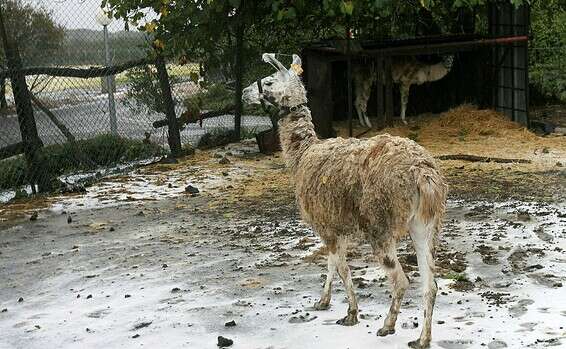Lemma developed in her body nano-antibodies that coat the corona "spike" protein • The hamsters and crabs that participated in the study • Thanks to them, there is also hope for a better future
Lemma that helps develop a cure for corona
Photography:
Dror Artzi, Ginny
The enthusiasm around finding the vaccine for Corona, and the drugs that are still being worked on these days for those infected with the virus, has managed to make them forget the fact that there are animals to which humanity owes a huge thank you for finding these drugs.
An article published on the Guardian's website reveals the first heroine of developing a cure for the respiratory virus - why it is called "Krumak".
Krumak lives on a farm in Washington state, and does not know that she has developed nano-antibodies in her body that have been found to be very essential in the fight against the virus.
Nano-antibodies are a microscopic-sized human bacterial and viral defense system.
The producers in the wild of nano-antibodies are members of the camel family: the camels, bats and alpacas, hundreds of which have reluctantly partnered in the search for good nano-antibodies against the corona.
The search came to a good conclusion after one of the nano-antibodies isolated from Cormac's body provided the desired result and was found to coat the hook protein (the "spike" protein) that characterizes the corona virus, thus preventing it from penetrating the human body.
According to Dr. David Brody, one of the researchers involved in the development of nano-antibodies, "This is a product that can be a primary remedy for someone who has been exposed to a verified patient. Such a person has been near you or sneezed in your environment.
They are very easy to manufacture, can come in powder form and do not need to be kept refrigerated.
You breathe them into your lungs and they go straight into activity. "
But unlike Cormac, which enjoys a relatively good life, hundreds of millions of animals that the vaccine was tested on during its development will not have a healthy and easy life on the farm, but will be housed in cages and likely die during the process.
These are Siberian hamsters, rats, monkeys, horseshoe crabs, ferrets and pigs that have reluctantly partnered in the global race to find a cure for the virus.
"Everyone wants to except the animal experiments. I do not know a reasonable person who does not want to reduce the suffering of the animals we are experimenting with," says Professor Colin Futon, a biology expert on drugs at Monash University in Melbourne.
"But the point is that reducing the use of experiments by nature means agreeing to the production of drugs that can harm different stages in humans. That is, if we stop animal testing it means going beyond human experiments instead. Beyond that today there are really no alternatives."
"Very few scientists at all are willing to talk about the price of the drug race because of the public anger that such a discussion might generate," the scientist added.
The one who still works to raise awareness of the issue is the artist and social activist Miranda Fitch: "A lot of people repress our use of animals. I think that even if there is no choice and we have to experiment with them, we must not forget the price they pay."
Pitch as a sign of protest even printed on a T-shirt the seven species of animals on which the corona experiments are performed.
"Even if it is impossible to stop the experiments, at least we will thank those who help us," she said.
The sad case of horseshoe cancer
One of the animals required for the development of the human vaccine is the American horseshoe crab, a species that has survived the world 450 million years including four periods of mass extinction.
Despite its survivability, horseshoe cancer is now endangered.
The blue blood of cancer is the only one in nature that produces coagulants, which are required for a wide variety of vaccines and drugs.
Scientists are aware of the danger of extinction in question, and remove the crabs from the sea, take between 20-30 percent of their blood, and return the crabs to the water.
However, between five and twenty percent of crabs die in the process, and some females that return to the sea after it have difficulty reproducing.
"It makes sense that we would like to produce health drugs that humans will not harm. On the other hand, no one wants to eradicate horseshoe cancers so this is a good time to have a discussion on the subject," says Miranda Fitz.
"A great many people reacted very sharply to my journey and said that there is no choice and that it is for the good of humanity. But I think that what we do should not be suppressed in order to carry out research on how to skip animal experiments."
Transition from experiments in monkeys to experiments on Siberian hamsters
Those who benefited from the corona plague, paradoxically, are the human apes and the other types of monkeys who were previously experimenters with human remedies.
There was a huge shortage of them so many researchers skipped them and used Siberian hamsters that have an ACE2 receptor similar to the human receptor.
In this regard, Professor Futon says that "the current epidemic has pushed researchers to new solutions and it has become clear that experiments on monkeys do not always have to be done.
So in large part at least because of the global urgency to fight the plague the monkeys have gained some peace.

